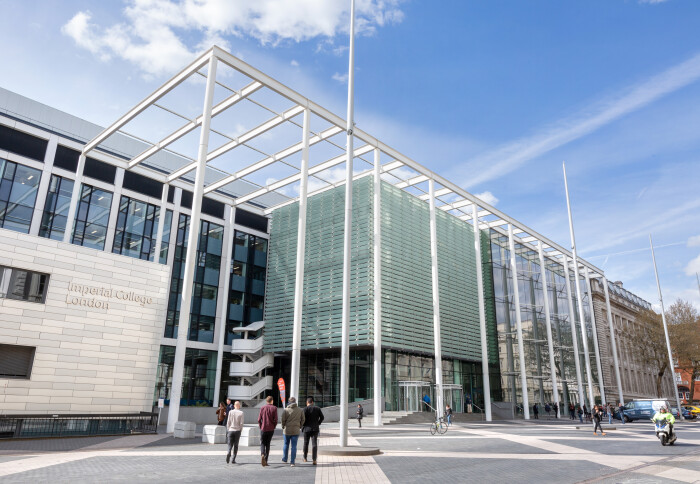National Academy of Engineering elects three International Members from Imperial
by Helen Wilkes

Three engineers from Imperial College have been elected to the National Academy of Engineering (NAE).
Emeritus Professor Tony Constantinides from the Department of Electrical and Electronic Engineering, Professor Constantinos Pantelides and Dr Salvador García Muñoz, Department of Chemical Engineering were elected in the latest ballot.
NAE membership honours those who have made outstanding contributions to engineering research, practice, or education, including significant contributions to the engineering literature and to the pioneering of new and developing fields of technology, making major advancements in traditional fields of engineering, or developing/implementing innovative approaches to engineering education. NAE members, who number more than 2600, are highly accomplished engineering professionals representing a broad spectrum of engineering disciplines working in business, academia, and government.
Election of new NAE members is the culmination of a year-long process. The ballot is set in December and the final vote for membership occurs during January. Individuals in the newly elected class will be formally inducted during the NAE's annual meeting in September 2024.
Professor Tony Constantinides

Professor Constantinides is Professor of Communications and Signal Processing and former Head of Communications and Signal Processing Division of the Department of Electrical and Electronic Engineering. He has been actively involved with research in various aspects of digital signal processing, digital image processing, digital filter design, and communications for more than 45 years. His recent work has been directed toward the demanding problems arising in financial signal processing and he now leads the Financial Signal Processing Lab.
On his election, Professor Constantinides said: ‘I am delighted with the election to the prestigious National Academy of Engineering. I consider it to be a reflection of the research we do at Imperial College and the outstanding quality of our students.’
Dr Salvador García Muñoz

Dr García Muñoz has held key roles at Pfizer Inc. and Eli Lilly and Company, providing modeling solutions for the development of new medicines. Additionally, he holds professorial appointments at Imperial College London, Carnegie Mellon University, and University College London.
Dr García Muñoz obtained his bachelor's degree in Chemical and Computer Systems Engineering from Monterrey Tech in Monterrey, N.L., Mexico in 1993. In 1997, he earned his M.Sc. in Chemical Engineering from the same institution. He worked at Aspen Technology as a technical support engineer before pursuing his doctoral degree at McMaster University, which he completed in 2004. His research focused on the development and application of multivariate data analysis for process design, monitoring, and troubleshooting.
On receiving news of his membership, Dr García Muñoz said: '[I'm] surprised of course! Humbled and most than anything thankful for my family, teachers, mentors, colleagues and friends that have patiently helped me grow.'
Professor Constantinos Pantelides

Professor Pantelides is currently the CTO of Siemens Process Automation Software and Professor of Chemical Engineering at Imperial College London. He was a co-founder, and subsequently CTO and CEO of Process Systems Enterprise Ltd., one of Imperial’s largest spin-out companies acquired by Siemens AG in 2019.
He has been working in the area of process modelling technology for more than 3 decades, with particular focus on the design and architecture of the underpinning software, and also on mathematical methods the solution of large-scale simulation and optimization.
Professor Pantelides said: ‘I have had close links and extensive collaboration with the US engineering community, in both industry and academia, throughout my career. I am delighted and truly honoured to be elected as a member to the National Academy of Engineering.’
On the recent new electees, NAE President John L. Anderson commented: ‘Election to the National Academy of Engineering is one of the highest professional honours accorded to an engineer. On behalf of the NAE, I offer our sincerest congratulations and extend a warm welcome to the new members and international members who have been elected to the NAE Class of 2024.
Being elected to the National Academy of Engineering is an honour, but an honour that comes with a service obligation. As leading experts in their field, NAE members volunteer their time on initiatives that help guide the development of federal laws and regulations, improve the effectiveness of government programmes, shape the direction of research fields and engineering education, and inform public knowledge and dialogue about issues of critical importance.
As a member of the National Academy of Engineering, these professionals belong to a select group of national and international peers who advance the welfare and prosperity of the nation by providing independent advice on matters involving engineering and technology, and by promoting a vibrant engineering profession and public appreciation of engineering.’
Article text (excluding photos or graphics) © Imperial College London.
Photos and graphics subject to third party copyright used with permission or © Imperial College London.
Reporter
Helen Wilkes
Faculty of Engineering